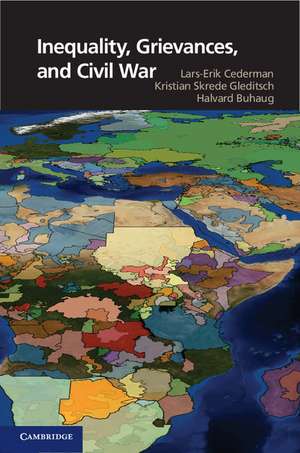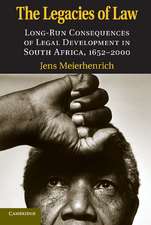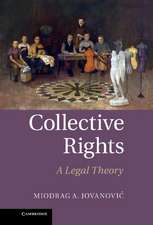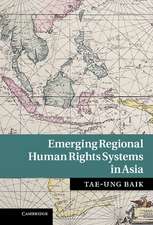Inequality, Grievances, and Civil War: Cambridge Studies in Contentious Politics
Autor Lars-Erik Cederman, Kristian Skrede Gleditsch, Halvard Buhaugen Limba Engleză Hardback – 25 aug 2013
| Toate formatele și edițiile | Preț | Express |
|---|---|---|
| Paperback (1) | 204.48 lei 43-57 zile | |
| Cambridge University Press – 25 aug 2013 | 204.48 lei 43-57 zile | |
| Hardback (1) | 659.86 lei 43-57 zile | |
| Cambridge University Press – 25 aug 2013 | 659.86 lei 43-57 zile |
Din seria Cambridge Studies in Contentious Politics
-
 Preț: 251.27 lei
Preț: 251.27 lei -
 Preț: 220.86 lei
Preț: 220.86 lei -
 Preț: 203.50 lei
Preț: 203.50 lei -
 Preț: 238.15 lei
Preț: 238.15 lei - 9%
 Preț: 626.76 lei
Preț: 626.76 lei -
 Preț: 162.90 lei
Preț: 162.90 lei -
 Preț: 210.37 lei
Preț: 210.37 lei -
 Preț: 160.00 lei
Preț: 160.00 lei -
 Preț: 178.72 lei
Preț: 178.72 lei -
 Preț: 289.11 lei
Preț: 289.11 lei -
 Preț: 197.42 lei
Preț: 197.42 lei -
 Preț: 231.38 lei
Preț: 231.38 lei -
 Preț: 263.79 lei
Preț: 263.79 lei -
 Preț: 274.27 lei
Preț: 274.27 lei -
 Preț: 227.61 lei
Preț: 227.61 lei - 11%
 Preț: 637.54 lei
Preț: 637.54 lei -
 Preț: 474.87 lei
Preț: 474.87 lei -
 Preț: 225.50 lei
Preț: 225.50 lei -
 Preț: 269.58 lei
Preț: 269.58 lei -
 Preț: 201.59 lei
Preț: 201.59 lei -
 Preț: 229.56 lei
Preț: 229.56 lei -
 Preț: 238.13 lei
Preț: 238.13 lei -
 Preț: 306.73 lei
Preț: 306.73 lei - 11%
 Preț: 553.62 lei
Preț: 553.62 lei - 11%
 Preț: 694.04 lei
Preț: 694.04 lei -
 Preț: 231.05 lei
Preț: 231.05 lei -
 Preț: 305.33 lei
Preț: 305.33 lei -
 Preț: 201.59 lei
Preț: 201.59 lei -
 Preț: 230.51 lei
Preț: 230.51 lei - 14%
 Preț: 791.97 lei
Preț: 791.97 lei - 11%
 Preț: 555.03 lei
Preț: 555.03 lei -
 Preț: 251.27 lei
Preț: 251.27 lei -
 Preț: 251.27 lei
Preț: 251.27 lei - 11%
 Preț: 459.73 lei
Preț: 459.73 lei -
 Preț: 267.08 lei
Preț: 267.08 lei
Preț: 659.86 lei
Preț vechi: 741.42 lei
-11% Nou
Puncte Express: 990
Preț estimativ în valută:
126.30€ • 137.24$ • 106.16£
126.30€ • 137.24$ • 106.16£
Carte tipărită la comandă
Livrare economică 21 aprilie-05 mai
Preluare comenzi: 021 569.72.76
Specificații
ISBN-13: 9781107017429
ISBN-10: 1107017424
Pagini: 276
Ilustrații: 39 b/w illus. 17 tables
Dimensiuni: 150 x 229 x 13 mm
Greutate: 0.5 kg
Ediția:New.
Editura: Cambridge University Press
Colecția Cambridge University Press
Seria Cambridge Studies in Contentious Politics
Locul publicării:New York, United States
ISBN-10: 1107017424
Pagini: 276
Ilustrații: 39 b/w illus. 17 tables
Dimensiuni: 150 x 229 x 13 mm
Greutate: 0.5 kg
Ediția:New.
Editura: Cambridge University Press
Colecția Cambridge University Press
Seria Cambridge Studies in Contentious Politics
Locul publicării:New York, United States
Cuprins
1. Introduction; Part I. Theories and Concepts: 2. Inequality and grievances in the civil war literature; 3. From horizontal inequality to civil war via grievances; Part II. Analyzing the Outbreak of Civil War: 4. Political exclusion and civil war; 5. Economic inequality and civil war; 6. Transborder ethnic kin and civil war; 7. Country-level inequalities and civil war; Part III. Beyond Civil War Onset: 8. Political exclusion and the duration and outcomes of civil war; 9. Conclusions for theory and policy.
Recenzii
'The role of grievances in insurgency and civil war has had a roller coaster career since the 1970s. Once regarded as prime causes of these conflicts, grievances subsequently were shelved in favor of factors like resources, political opportunities, and state capacity. Inequality, Grievances, and Civil War makes a persuasive case that the literature has thrown the baby out with the bath water. Based on the methodologically sophisticated analysis of comprehensive new cross-national databases, Cederman and his associates reinstate the causal priority of shared grievances in explaining civil war - an achievement that has profound policy implications. A must-read for scholars of civil conflict.' Michael Hechter, Arizona State University and the University of Copenhagen
'The cross-national study of civil wars built its initial reputation on two striking claims. First, civil conflict is driven more by opportunities and less by grievances. Second, ethnic diversity is not a driver of violent civil conflict. A long and inconclusive debate followed and several major studies were conducted to probe these initial findings. Inequality, Grievances, and Civil War provides very robust evidence in support of the claim that grievances do matter after all and that ethnicity is a key driver of conflict when conceptualized in terms of the inequalities between ethnic groups. This is a major contribution that will shape research on civil conflict in a decisive way.' Stathis Kalyvas, Yale University, Connecticut
'Over the past many years, political scientists and economists have tried to evaluate group-level grievances through demographic measures such as fractionalization and polarization. Cederman, Gleditsch, and Buhaug first show why these measures fail to capture the force of political and economic exclusion and the logic of nationalism. Then they create new conceptualizations and corresponding measures, and collect a massive amount of appropriate and detailed data to test their hypotheses. The end result is a convincing argument that specifies the power of ethnic group grievances in the onset of conflict as well as its duration and outcomes. For both substantive and methodological reasons, this book should be required reading in classes on ethnic politics and ethnic conflict.' Roger Petersen, Arthur and Ruth Sloan Professor of Political Science, Massachusetts Institute of Technology
'In contrast to many contemporary analyses of violent conflict, this brilliant book takes the expressed motives of conflict participants seriously as well as the evident identity basis of most civil wars. It confirms the view that political and economic horizontal inequalities are a fundamental cause of conflict. The book is a refreshing challenge to both those who take a Hobbesian view of human nature and those who assume that individual greed is an all-embracing motive.' Frances Stewart, University of Oxford
'The cross-national study of civil wars built its initial reputation on two striking claims. First, civil conflict is driven more by opportunities and less by grievances. Second, ethnic diversity is not a driver of violent civil conflict. A long and inconclusive debate followed and several major studies were conducted to probe these initial findings. Inequality, Grievances, and Civil War provides very robust evidence in support of the claim that grievances do matter after all and that ethnicity is a key driver of conflict when conceptualized in terms of the inequalities between ethnic groups. This is a major contribution that will shape research on civil conflict in a decisive way.' Stathis Kalyvas, Yale University, Connecticut
'Over the past many years, political scientists and economists have tried to evaluate group-level grievances through demographic measures such as fractionalization and polarization. Cederman, Gleditsch, and Buhaug first show why these measures fail to capture the force of political and economic exclusion and the logic of nationalism. Then they create new conceptualizations and corresponding measures, and collect a massive amount of appropriate and detailed data to test their hypotheses. The end result is a convincing argument that specifies the power of ethnic group grievances in the onset of conflict as well as its duration and outcomes. For both substantive and methodological reasons, this book should be required reading in classes on ethnic politics and ethnic conflict.' Roger Petersen, Arthur and Ruth Sloan Professor of Political Science, Massachusetts Institute of Technology
'In contrast to many contemporary analyses of violent conflict, this brilliant book takes the expressed motives of conflict participants seriously as well as the evident identity basis of most civil wars. It confirms the view that political and economic horizontal inequalities are a fundamental cause of conflict. The book is a refreshing challenge to both those who take a Hobbesian view of human nature and those who assume that individual greed is an all-embracing motive.' Frances Stewart, University of Oxford
Notă biografică
Descriere
This book argues that political and economic inequalities following group lines generate grievances that in turn can motivate civil war.















